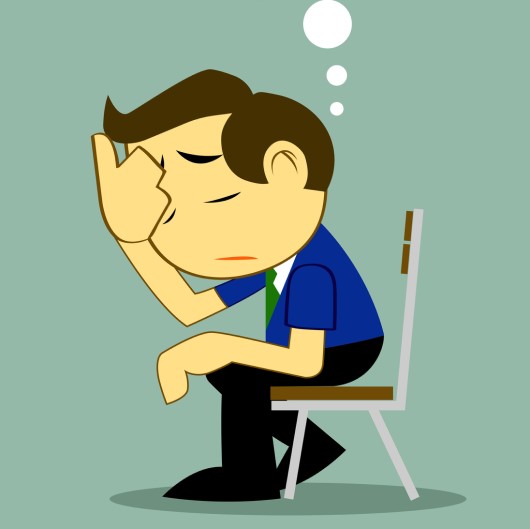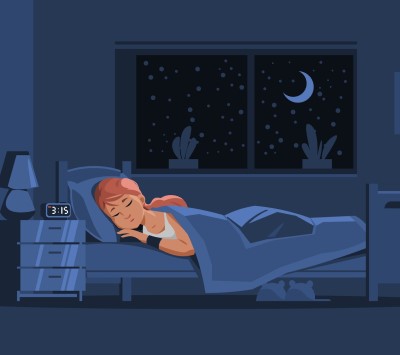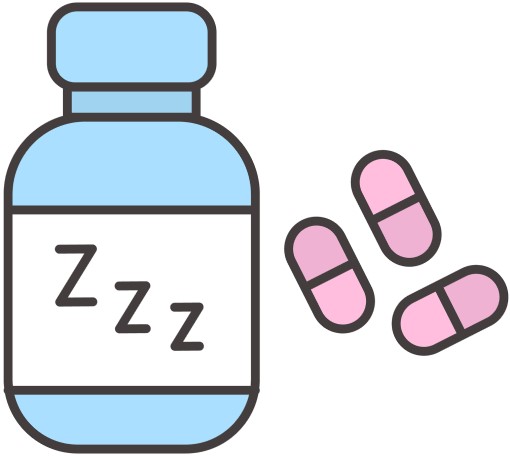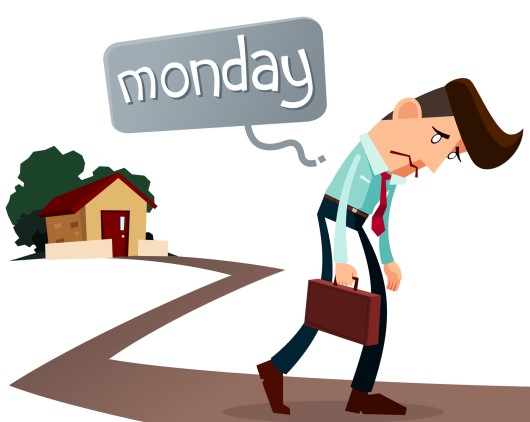
Worried about losing your job and can’t sleep? – 13 practical remedies to get your nights (and days) back on track
By Jason Wooden, PhD | May 25, 2023
If you’re losing sleep over job worries, the stress is likely affecting your prospects and health in other ways too. Fortunately, there’s plenty you can do for your sleep, peace of mind, and to make the most of things. Your options include sleep hygiene, stress management, sleep friendly activities, natural sleep aids, financial preparation, working strategically, and starting an informal job search.
So, you think it’s just you who’s losing sleep over job worries?
With layoffs at the highest level in over two years, you’re not the only one who’s worried about a job and can’t sleep.
We’re living in interesting times for sure with all sorts of crazy things going on in the economy.
Here’s a jaw dropper…
A recent Morning Consult survey found that 75% of Americans were worried about job losses.
That’s A LOT of anxious people and more than a few are likely losing sleep.
Remember the recession after 9-11? Startups took a big hit and one night I actually had a dream in which a company exec approached me as I was the leaving a work event to say he was sorry to have to let me go.
Believe it or not, I was let go three days later! Go figure, must have been something I felt in the air.
Nonetheless, talk about being anxious…
Speaking of which, there’s a long list of things besides your job to be anxious about these days – high inflation, crime, store closures, bank failures, and a looming recession.
And it’s affecting the sleep of millions whether it’s crazy dreams or restless nights.

All the same, there’s too much at stake to accept the status quo if you find you’re regularly losing sleep over worries about the recession or losing your job.
Let’s take a look at what you’re really up against and some practical remedies that can make a real difference for you.
What all the stress, worry and anxiety is doing to your sleep (and health!)
If you’re finding it hard to sleep because you’re worried about losing your job, it’s no wonder.
Occasional stress and anxiety is a normal thing. It’s when it keeps happening that you can really get in trouble especially at bed time.
A racing mind makes it hard to drift off to sleep.
As you get more and more stressed out, your body turns on the fight-or-flight response and pumps out stress hormones designed to get you in a heightened state of arousal and prepare your muscles for action.
A state of mental hyperarousal has been identified as a key factor for insomnia.
That’s why stress and anxiety is so bad at night – it makes it harder to fall asleep AND harder to stay asleep throughout the night.
Just as bad are all the other things ongoing stress, worry, and anxiety does to your body:
- digestive issues (such as upset stomach or diarrhea)
- heart issues
- more aches and pains
- headaches
- weight loss or gain
- sexual issues
- emotional issues
Sleepless nights is tough enough. Add to mix other issues, it can be real downer.
The truth is you really need to be at your best as you navigate whatever is coming down the pike.
You need to get the best possible sleep every night so you can make the best of your current job situation and make the right moves if needed.
Practical remedies worth a try if you’re losing sleep because of job worries
Let’s be honest.
What’s happening in the economy and how it will affect where you work is pretty much out of your control.
If you’re losing sleep because of job worries, it can make things even more frustrating.
Also, keep in mind there’s a strong link between sleep and job performance.
So, let’s focus on what you can do about your sleep so you’re really at your best.
The good news is that there’s plenty of practical things you can do so job worries DON’T keep you up at night:

1) Improve your sleep hygiene
Getting a decent night of sleep can be tough enough.
To avoid making sleep even harder, make sure you’re following the rules for healthy sleep, aka sleep hygiene. It’s the everyday habits that can make or break sleep.
For better sleep hygiene, you should:
- Wake up and go to bed at the same time every day
- Physical activity
- Avoid naps
- Avoid large meals, alcohol, and stimulants such as caffeine before bedtime
- Maintain a bedtime routine
- Avoid TVs, laptops, and other electronics near bedtime
- Keep your bedroom dark, cool, quiet, & relaxing

2) Put yourself on a media diet
A steady diet of breaking news can leave you wired up and feeling down. So much of it is bad including news segments about the latest company layoffs.
Trying unplugging (or at least cutting back) on your news feeds from TV, Facebook, and Twitter. It may even be helpful to unplug some text threads depending on the topic.
Be sure to avoid news media in the hours before you go to bed. The news will be there waiting for you in the morning…

3) Stress management
Since stress is such a huge factor for sleep, it’s important to do whatever you can to manage the stress in your life. It could be better self-care, boundary setting, improving your work-life balance, or managing expectations.
Learn more:
Stress Management (HelpGuide.org)
Six relaxation techniques to reduce stress

4) Exercise
Did you know that physical activity triggers the release of endorphins and other chemicals that improve mood? It’s great for stress, anxiety, AND depression.
Studies have shown that physical activity can help people fall asleep faster, sleep more deeply, and sleep longer.
So, get out for a walk in the park, go for a swim, or dance to your favorite music.

5) Find some sleep-friendly ways to pass the time
It’s important to avoid doing anything that will get you more wired up and make it even harder to fall asleep. So, find some sleep-friendly things to occupy yourself with on the nights you can’t sleep because your mind is racing with worries over losing your job.
Do things that will help you relax and more quickly transition to sleep. It could be light reading, working on a puzzle, or listening to quiet music.
More ideas: 18 Fun things to do before bed that won’t wreck your sleep

6) Try a relaxation exercise
Relaxation exercises are a time tested way to calm the mind and body.
There are plenty of techniques worth a try:
Visualization
Light stretching
Deep breathing
Progressive muscle relaxation

7) Meditation
Try mindfulness meditation or some other mental practice. It’s another great way to calm the mind and body.

9) Natural relaxation aids
There’s a wide variety of natural sleeping aids that work by fighting stress and anxiety. Among the better known remedies are:
Chamomile – Extracts made from dried flowers of the chamomile plant have been shown to reduce anxiety and promote relaxation.
Lavender Essential Oils – Extracts prepared from the flowers of the plant are used in aromatherapy to reduce anxiety and promote relaxation.
Valerian root extracts – have been shown in studies to help fight anxiety and promote relaxation.
Ashwagandha – One of the most powerful herbs used in Ayurvedic healing, it’s thought to work as a moderator of the body’s response to stress. The root and berry are used to reduce anxiety and calm the body.
CBD oil – so far, looking promising for anxiety in studies. CBD (cannabidiol) is derived from the hemp plant which is a cousin of the marijuana plant. Unlike marijuana, it does not contain the psychoactive THC (tetrahydrocannabinol) which causes a “high.”
Before trying out a natural remedy, it’s recommended that you check with a complementary health specialist about whether it’s right for you, possible side effects, and the best way to use it.

10) Sleep meds
As a short-term remedy, your doctor may recommend over the counter or prescription sleep meds to help you get some rest and get back on a more regular sleep schedule.
Keep in mind sleeping pills are not the first choice for treating ongoing insomnia due to their side effects such as dependency. For some people, the sleeping pills may stop working as the body builds up a tolerance to them.

11) Sleep counseling
There’s a strong connection between the mind and body. Your mind, brain, behaviors, and body can interact in powerful ways that affect health and wellness.
A specialized type of sleep counseling, cognitive behavioral therapy, can help identify and change thoughts and behaviors that affect sleep. Believe it or not, it’s one of the most effective insomnia treatments.

12) See a doctor
When was the last time you had a checkup? Too many people are unaware how many other medical issues can cause problems or worsen sleep.
Things like asthma, allergies, acid reflux and heartburn, heart issues, chronic pain, and diabetes can keep you up at night. Even some prescription drugs can affect sleep.
You may also be living with an undiagnosed sleep disorder such as sleep apnea.

13) Talk to someone
Stress, anxiety, and depression can leave you feeling drained.
And there’s of course the strong connection to poor sleep. If you’re not careful, you can get into a downward spiral where one causes more of the other.
It turns out cognitive behavioral therapy has been found to be helpful for both anxiety and depression.
Taking action: How focusing on the things you control can make a BIG difference
Sleepless nights because of job worries is frustrating enough.
Not knowing what’s going to happen next can leave you feeling overwhelmed and sometimes powerless.
It can make it tough to go into work.

Focusing on the things you can control and doing what you can make a big difference. It can be empowering and free your mind up to make the best of things.
It can lessen the grip of worry and depression making it easier to get sleep.
Depending on your situation, some things that may help include:
Keep things in perspective
Keep in mind it is what it is. Recognize the things that are out of your control and focus on what you can do.
Detach your identity and self-worth from your job. Start spending more time on outside interests you enjoy and relationships.
Feed your mind
Mindset is everything. There are many different ways to nourish the mind whether it’s through a spiritual practice, meditation, mindfulness, or an uplifting book.
Make the most of your current job situation
Try to keep the communication lines open with your manager and coworkers. As much as you can, make sure you’re doing the things that are a priority. You may even want to reach out to a supervisor to see what else you can do to help out.
It goes without saying that this is probably not the time to cause waves or take long vacations…
Prepare your finances for the worst
Take a look at your finances and set up a worst case budget in case you are laid off. How much unemployment would you qualify for? Know what you can cut and explore other ways you can save money.
If you can, this is the time to build up your savings and start cutting unnecessary expenses.
Having a better idea where you’re at financially and have a game plan can give you some peace of mind.
Update your resume and LinkedIn profile
This one is pretty obvious. Start updating your resume and LinkedIn profile in case they’re needed…
Reach out to your contacts
Keep in mind most jobs are filled through referral. So, be sure to activate your network sooner rather than later so they can be on the lookout for you.
Start a job search
If you’re really worried and losing over your job, why not start putting some feelers out there? Maybe it’s time to respond to recruiter messages on LinkedIn and other places.
A career coach can help you explore your options and new directions.
Up your game
Based on what you’re seeing out there in the job market, this may be a good time to up your professional networking and up your skill sets. Perhaps there are some courses you can take on in-demand technical skills.
Or maybe there are some projects that you can volunteer for that can open some new avenues…
Start a side hustle
Whether it’s freelance, consulting, or just a part time job, a side hustle is a good way to diversify your income streams. It’s also a chance to dip your toe in the water with some of your transferable skills.
You may also be interested in:
10 Ways to quickly relieve stress and anxiety before bed
Worried about retirement and can’t sleep? – What to do for peace of mind
3 things to do if you’re worried and losing sleep over rising gas prices
16 Things to try to keep from falling asleep at work
How to stay awake in an online meeting
What to do if you’ve slept through your alarm for work
9 Things worth a try if you drank too much coffee
The best things to do before bed and pitfalls to avoid
10 things to try if politics is keeping you up at night
Product review: How I using turmeric curcumin for inflammation, pain, and better sleep
5 reasons why you should sleep on it when making major decisions
Sources:
1. US labor market softens as job openings drop, layoffs at highest level in over two years, 2023, Reuters
2. Despite Strong Labor Market Data, 75% of Americans Are Worried About Widespread Job Losses, 2023, MORNING CONSULT
3. “The Effects of Cortisol on Your Sleep”, 2020, Psychology Today website
4. Hyperarousal and sleep reactivity in insomnia: current insights. Nat Sci Sleep. 2018 Jul 17;10:193-201.
5. The Link Between Sleep and Job Performance, 2023, Sleepfoundation.org
6. “Exercise and Insomnia”, 2020, sleepfoundation.org
7. Layoff anxiety is real—but you can still thrive during challenging times. Here’s how, 2023, cnbc.com
8. What to Do If You’re Worried About a Layoff, 2022, LiveAbout
Connect with us:
About Us
Better Sleep Simplified® was founded as a place for you to get clear and well-researched information.
Our goal is to make sure you know about your options so that you take action sooner rather than later.
Check us out on YouTube:
Watch and Learn
Helpful sleep tips, interesting sleep facts and statistics you want to know about
Affiliate Disclosure
This site is a participant in the Amazon Services LLC Associates Program and other affiliate advertising programs designed to provide a means for sites to earn advertising fees by advertising and linking to them.
Important: BetterSleepSimplified.com is for informational purposes only and is not intended or implied to be a substitute for professional medical advice, diagnosis, or treatment. Always consult a physician for sleep and health concerns. See additional information.

